The Intel Core i9-9900KS Review: The 5 GHz Consumer Special
by Dr. Ian Cutress on October 31, 2019 10:45 AM ESTCPU Performance: Encoding Tests
With the rise of streaming, vlogs, and video content as a whole, encoding and transcoding tests are becoming ever more important. Not only are more home users and gamers needing to convert video files into something more manageable, for streaming or archival purposes, but the servers that manage the output also manage around data and log files with compression and decompression. Our encoding tasks are focused around these important scenarios, with input from the community for the best implementation of real-world testing.
All of our benchmark results can also be found in our benchmark engine, Bench.
Handbrake 1.1.0: Streaming and Archival Video Transcoding
A popular open source tool, Handbrake is the anything-to-anything video conversion software that a number of people use as a reference point. The danger is always on version numbers and optimization, for example the latest versions of the software can take advantage of AVX-512 and OpenCL to accelerate certain types of transcoding and algorithms. The version we use here is a pure CPU play, with common transcoding variations.
We have split Handbrake up into several tests, using a Logitech C920 1080p60 native webcam recording (essentially a streamer recording), and convert them into two types of streaming formats and one for archival. The output settings used are:
- 720p60 at 6000 kbps constant bit rate, fast setting, high profile
- 1080p60 at 3500 kbps constant bit rate, faster setting, main profile
- 1080p60 HEVC at 3500 kbps variable bit rate, fast setting, main profile
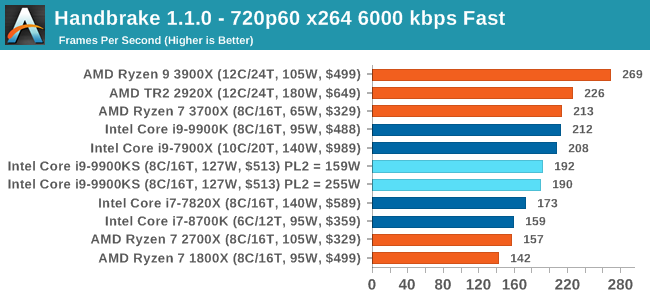
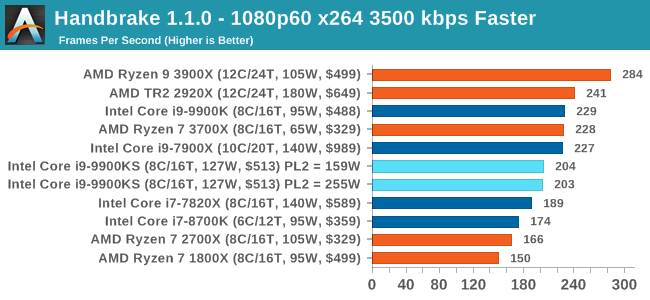
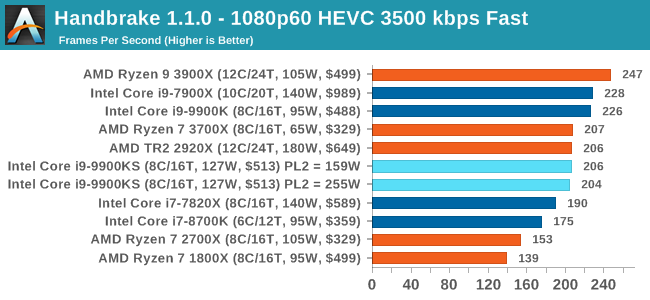
The 9900KS performed worse than our 9900K in our Handbrake tests, and we're not entirely sure why. It might be related to the regression we saw with DigiCortex.
7-zip v1805: Popular Open-Source Encoding Engine
Out of our compression/decompression tool tests, 7-zip is the most requested and comes with a built-in benchmark. For our test suite, we’ve pulled the latest version of the software and we run the benchmark from the command line, reporting the compression, decompression, and a combined score.
It is noted in this benchmark that the latest multi-die processors have very bi-modal performance between compression and decompression, performing well in one and badly in the other. There are also discussions around how the Windows Scheduler is implementing every thread. As we get more results, it will be interesting to see how this plays out.
Please note, if you plan to share out the Compression graph, please include the Decompression one. Otherwise you’re only presenting half a picture.
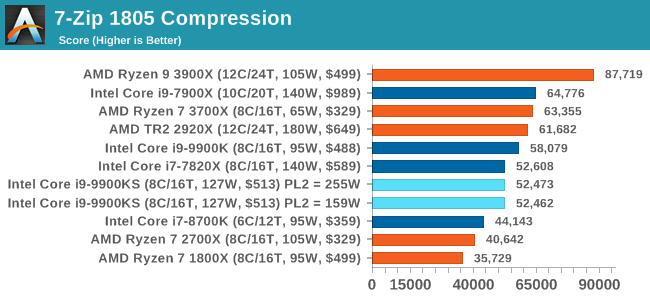
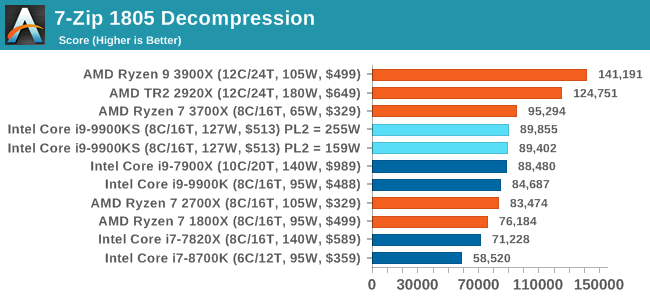
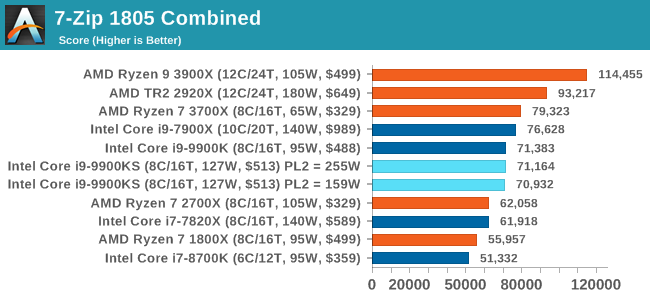
Both the 9900KS settings perform identically here, however the Compression test shows a performance regression compared to the standard 9900K. It does make me wonder if there are additional differences between the two chips (such as an internal clock).
WinRAR 5.60b3: Archiving Tool
My compression tool of choice is often WinRAR, having been one of the first tools a number of my generation used over two decades ago. The interface has not changed much, although the integration with Windows right click commands is always a plus. It has no in-built test, so we run a compression over a set directory containing over thirty 60-second video files and 2000 small web-based files at a normal compression rate.
WinRAR is variable threaded but also susceptible to caching, so in our test we run it 10 times and take the average of the last five, leaving the test purely for raw CPU compute performance.
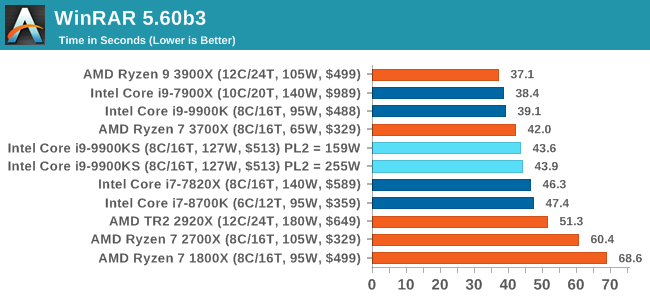
AES Encryption: File Security
A number of platforms, particularly mobile devices, are now offering encryption by default with file systems in order to protect the contents. Windows based devices have these options as well, often applied by BitLocker or third-party software. In our AES encryption test, we used the discontinued TrueCrypt for its built-in benchmark, which tests several encryption algorithms directly in memory.
The data we take for this test is the combined AES encrypt/decrypt performance, measured in gigabytes per second. The software does use AES commands for processors that offer hardware selection, however not AVX-512.
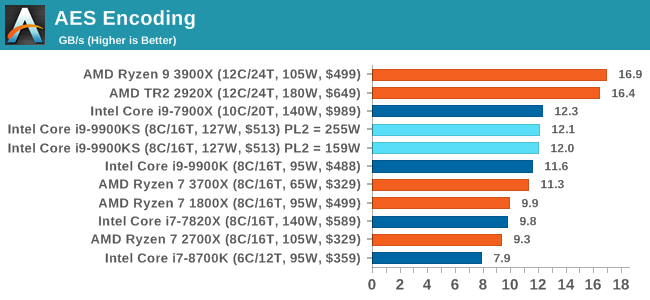










235 Comments
View All Comments
Dudler - Thursday, October 31, 2019 - link
P4 cough cough..Hifihedgehog - Friday, November 1, 2019 - link
*cough, cough* Emergency Edition *cough, cough*Man, whatever is going around is really catchy.
Spunjji - Friday, November 1, 2019 - link
It's vaguely amusing how they go for the same stock approaches every time. When a product becomes noncompetitive, either release a "special" bin that blows through acceptable power/stability limits, or ram a server CPU down the stack into "consumer" territory. The EE has a special place in my heart because they panicked so hard they did both of those things.Samus - Friday, November 1, 2019 - link
And much like the P4 EE, the power consumption is through the roof. Ahh the days of Presshot warming my dorm seeding a Napster queue.You really have to appreciate (again) what AMD is able to pull off here at 65w. It's literally on the heals of a CPU burning 3x more power.
Notmyusualid - Monday, November 4, 2019 - link
https://www.phoronix.com/scan.php?page=article&...Death666Angel - Saturday, November 2, 2019 - link
All true, but AMD does the same thing, as does Nvidia when it comes to GPUs. Remember the GTX 480? Or the FX-9590. :) If you mess up, that is mostly your only option to have something. Some people don't care much about efficiency and just want the fastest at a certain thing. They probably did the ROI numbers and it came out positive for them.Ratman6161 - Monday, November 4, 2019 - link
But...there are still quite a few tests where there is an orange bar at the top :). One thing I'm a bit curious about on the AMD side though is that there are several cases where the 3700X beats the 3900X. 3900X is both more cores and higher clocked so shouldn't it win everywhere?Also for those of us where price is an obejct, that 3700X looks pretty darn good against most everything else. :)
amnesia0287 - Friday, November 8, 2019 - link
It’s possible it’s related to the quality of the cores. With the Ryzen chips not all cores have the same limits. So in theory you could have a chip with less total cores but more higher spec’d ones.MDD1963 - Thursday, November 7, 2019 - link
Little need for any 'panic' as, gaming-wise at least, all AMD has managed is to tie the 8700K.....; everything 9700K and higher in the product stack remains virtually unopposed.WaltC - Monday, November 11, 2019 - link
I'm still trying to figure out how a higher clocked Intel CPU which processes data slower than a lower-clocked AMD cpu is a "clear advantage" for Intel....;) Perhaps Dr. Cutress might enlighten me...?....;)